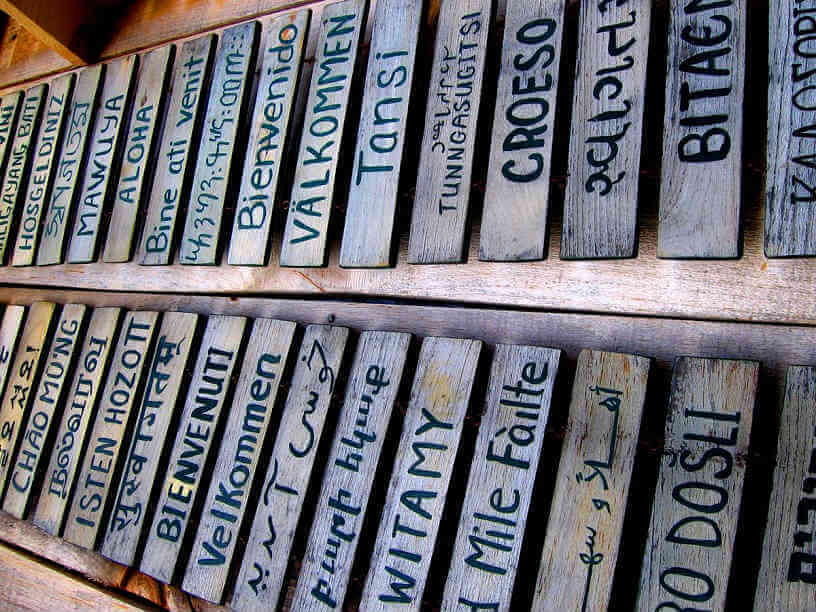10 Key Words You Should Know

There are currently 7,000 languages spoken around the world, but it's estimated that up to 90% of those languages will be extinct by 2050. It's impressive to learn a new language, and even more impressive to learn more than one, but should you find yourself short on time, there are few words and phrases to keep on hand to make the conversation flow.
Knowing these words and phrases will show that you are respectful of the locals in the country you're visiting and of their language. Being polite and courteous will also help you foster a positive connection with people as you travel around the world. Should you choose to travel to a country, city, town or village that speaks a language other than your own, take some time to learn these 10 essential words and phrases in their local language.
Hello
This is a universal greeting that you can say whenever you meet someone. It's a polite way to start a conversation and it acknowledges the other person.
Thank You
A universal term of politeness, you can say this whenever someone helps you, or you can substitute it for goodbye because any person you may have spoken with is likely to have helped you in some way.
Where Is
This is useful for when you need to get from one location to the next. You can start the sentence with this phrase and then point to a map or the name of where you need to go. Most people should understand that you will need directions or help getting to your next destination. Combine this phrase with "please" for a polite way to approach a stranger for help.
Please
Another politeness word, please can be used whenever someone offers to help you, or whenever you need help figuring something out. You can use this word in conjunction with "thank you" and "yes" to create polite and formal responses to questions and also to request a service or good. Ordering breakfast? "Egg please" sounds infinitely more polite than "egg".
I am sorry
Use this phrase when you sense that you may have said something wrong or inappropriate and feel an apology would be helpful and/or necessary. It also softens a request and indicates confusion if you can't understand a response they've given you.
Toilet
Getting the answer to this question is important, and the question can simply be the word for "toilet". Or precede the question with "please" or "excuse me" if you have to approach someone to ask them. If they respond in words instead of by pointing in the direction of a toilet, follow up with "I am sorry" and "do you speak English?" Once you get your answer, be sure to end the conversation with "thank you" before leaving.
Yes/No
"Yes" and "no" are essential words for carrying on conversations. While nonverbal shortcuts - like head nodding - can help you get by, knowing the actual words they use will be helpful should you need to respond to a question that's asked of you. You can use these responses in conjunction with "please" and "thank you" respectively to form a polite answer to a question.
How Much?
When you are navigating the city or town you're visiting, you will invariably need to purchase something, whether it's food, supplies, clothes or souvenirs. Knowing how to ask "how much" will let the person you're addressing know that you will need assistance with payment and may not be able to understand their standard price tags.
Excuse Me
Another politeness term, you should use "excuse me" in case you need to interrupt a conversation or get someone's attention. It's a great buffer should you need to say or do something that could potentially considered inappropriate.
Do You Speak English?
Sometimes you will need to find answers beyond your knowledge of the local language. When you need to carry a conversation beyond the nine words above, use the phrase with "excuse me" or "I am sorry" to inform the local person that you do not speak the local language or have an extensive grasp with the language.
Now that you have the list of words to know in every language, the key to success is practice. Say each word or phrase whenever you can and whenever it is appropriate. And, as noted above, many of the words and phrases can be used in tandem. For example, try combing a word of politeness ("please") with the questioning phrases ("where") for a respectful and courteous way to ask a question.
Should you find yourself outside your language comfort zone, there are online resources and tools you can turn to, to act as your virtual translator. For example, try Google Translate, iTranslate Voice or SayHi Translate—they all have mobile apps that you can download to your smartphone and carry with you.
Learning the language of your destination is important, and so is learning about your travel insurance options. Compare our plans today and find the proper travel insurance plan for your next holiday with Cover-More Australia Travel Insurance.
Image courtesy of Flickr user ButterflySha.
Planning a trip?
Discover Our COVID-19 Cover
To find out what our current* benefits do – and don’t – cover, please read:
Plus, for helpful destination-based COVID-19 information, don't forget to check the COVID-19 Travel Risk Tool before and during travel.
*The cover information contained on the above pages refers to Cover-More policies sold on or after 26 June 2023. For cover information on policies sold prior to this date, please read the relevant PDS.